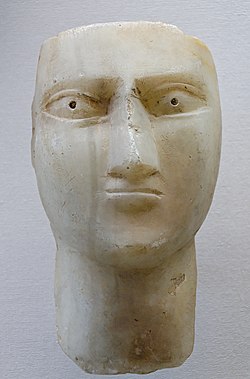alabastro
Esperanto
Noun
alabastro (accusative singular alabastron, plural alabastroj, accusative plural alabastrojn)
- alabaster
- Li kopiis La Pietá de Michelangelo en alabastro.
- He copied Michaelangelo's Pietá in alabaster.
Related terms
- alabastra; made of alabaster, white, ghostly
Italian
Etymology
From Latin alabastrum, or borrowed from Ancient Greek ἀλάβαστρος (alábastros), from earlier ἀλάβαστος (alábastos, “vase made of alabaster”).
Noun
alabastro m (plural alabastri)
Derived terms
Latin
Noun
(deprecated template usage) alabastrō
Portuguese
Etymology
Borrowed from Latin alabastrum, from Ancient Greek ἀλάβαστρος (alábastros), from earlier ἀλάβαστος (alábastos, “vase made of alabaster”).
Noun
alabastro m (plural alabastros)
See also
Further reading
Spanish

Etymology
Borrowed from Latin alabastrum, from Ancient Greek ἀλάβαστρος (alábastros), from earlier ἀλάβαστος (alábastos, “vase made of alabaster”). This may further derive from Egyptian ꜥj-r-bꜣstjt (“vessel of the Egyptian goddess Bast”).
Pronunciation
Noun
alabastro m (plural alabastros)
- alabaster (variety of gypsum)
Derived terms
Further reading
Tagalog
Etymology
Borrowed from Spanish alabastro (“alabaster”), from Old French alabastre, from Latin alabaster (“box for perfume made of alabaster”), from Ancient Greek ἀλάβαστρος (alábastros), from earlier ἀλάβαστος (alábastos, “vase made of alabaster”). This may further derive from Egyptian ꜥj-r-bꜣstjt (“vessel of the Egyptian goddess Bast”).
Noun
alabastro
- Esperanto lemmas
- Esperanto nouns
- Italian terms derived from Latin
- Italian terms borrowed from Ancient Greek
- Italian terms derived from Ancient Greek
- Italian lemmas
- Italian nouns
- Italian countable nouns
- Italian masculine nouns
- it:Minerals
- Latin non-lemma forms
- Latin noun forms
- Portuguese terms borrowed from Latin
- Portuguese terms derived from Latin
- Portuguese terms derived from Ancient Greek
- Portuguese lemmas
- Portuguese nouns
- Portuguese countable nouns
- Portuguese masculine nouns
- Spanish terms borrowed from Latin
- Spanish terms derived from Latin
- Spanish terms derived from Ancient Greek
- Spanish terms derived from Egyptian
- Spanish 4-syllable words
- Spanish terms with IPA pronunciation
- Spanish lemmas
- Spanish nouns
- Spanish countable nouns
- Spanish masculine nouns
- es:Minerals
- Tagalog terms borrowed from Spanish
- Tagalog terms derived from Spanish
- Tagalog terms derived from Old French
- Tagalog terms derived from Latin
- Tagalog terms derived from Ancient Greek
- Tagalog terms derived from Egyptian
- Tagalog lemmas
- Tagalog nouns
